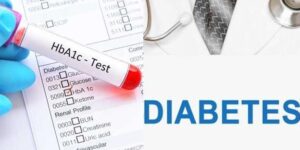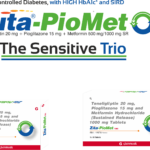India Diabetes Care Index shows, the average diabetes control level continues to decrease in Mumbai.
- The average HbA1c level – the best indicator of a patient’s long-term blood sugar control, stood at 8.23% for people living with diabetes in Mumbai.
- The risk of fatal outcome and severe health complications from COVID-19 is up to 50% higher in people with diabetes.
- 12900 people with an average age of 57 years were part of the analysis in the city, out of which 78% were male and 22% were female.


26th November 2020, Mumbai: In the run-up to World Diabetes Day, the Novo Nordisk Education Foundation had unveiled the second-year report of its Impact India: 1000-Day Challenge’ programme. The programme was launched two years ago to address the issue of sub optimally controlled diabetes in India. According to the report, the average HbA1c level in Mumbai was recorded at 8.23% in September 2020.
Though the average HbA1c level has decreased marginally compared to last year’s figures, the overall high HbA1c levels is still a matter of deep concern especially in the light of the COVID-19 pandemic which puts people with uncontrolled diabetes at a higher risk of a fatal outcome and serious health complications. HbA1c is the best recommended indicator of long-term blood sugar control and gives an average blood sugar control over the preceding three months. 12900 people with an average age of 57 years were part of the analysis in the city, out of which 78% were male and 22% were female.
Speaking about the report, Dr Manoj Chadha, Consultant Endocrinologist, P D Hinduja Hospital and Medical Research Centre, Mumbai said, “The receding level of HbA1c in Mumbai indicates that irrespective of the COVID-19 pandemic and the doctor unavailability, people with diabetes are taking care of their health within the confines of their residences. They should continue doing so, since the risk of fatal outcome and adverse health complications from COVID-19 is up to 50% higher among people living with diabetics. It is important to maintain a healthy lifestyle to keep the glucose level well monitored because uncontrolled diabetes can cause organ failures as well.”
With the existing pandemic situation with COVID-19, people with diabetes should keep an adequate stock of medications and supplies for monitoring blood glucose at home. If symptoms like difficulty in breathing or shortness of breath, fever, dry cough, tiredness, aches and pains, sore throat, headache, loss of taste or smell are experienced, immediate medical attention should be sought.[1]
IDCI is a part of the ‘Impact India: 1000-Day Challenge’ programme by Novo Nordisk Education Foundation and serves as a guiding tool for the status of diabetes care across India. iDCI was introduced in 2018 as part of the programme to monitor the diabetes care status in the country. Based on big data analytics, iDCI has been providing a real-time view of the average HbA1c in India, a key indicator of the state of diabetes control across select cities.
At present, more than 77 million people are living with diabetes in India. Under the IMPACT India programme, digital platforms are being leveraged to partner with practitioners (doctors and paramedics) to evolve and implement an approach to diabetes care appropriate to India. iDCI is a dynamic tool that not only tracks the status of diabetes care but also helps to increase awareness, motivate and sensitize healthcare professionals (HCPs) and society. The last two years of the programme have seen significant contributions from HCPs and people living with diabetes from across the country. There has been an improving trend in the iDCI results every quarter, and this would lead to a reduction in the future burden of diabetes-related complications in India.
For more information visit: Novo Nordisk Education Foundation – nnef.in













